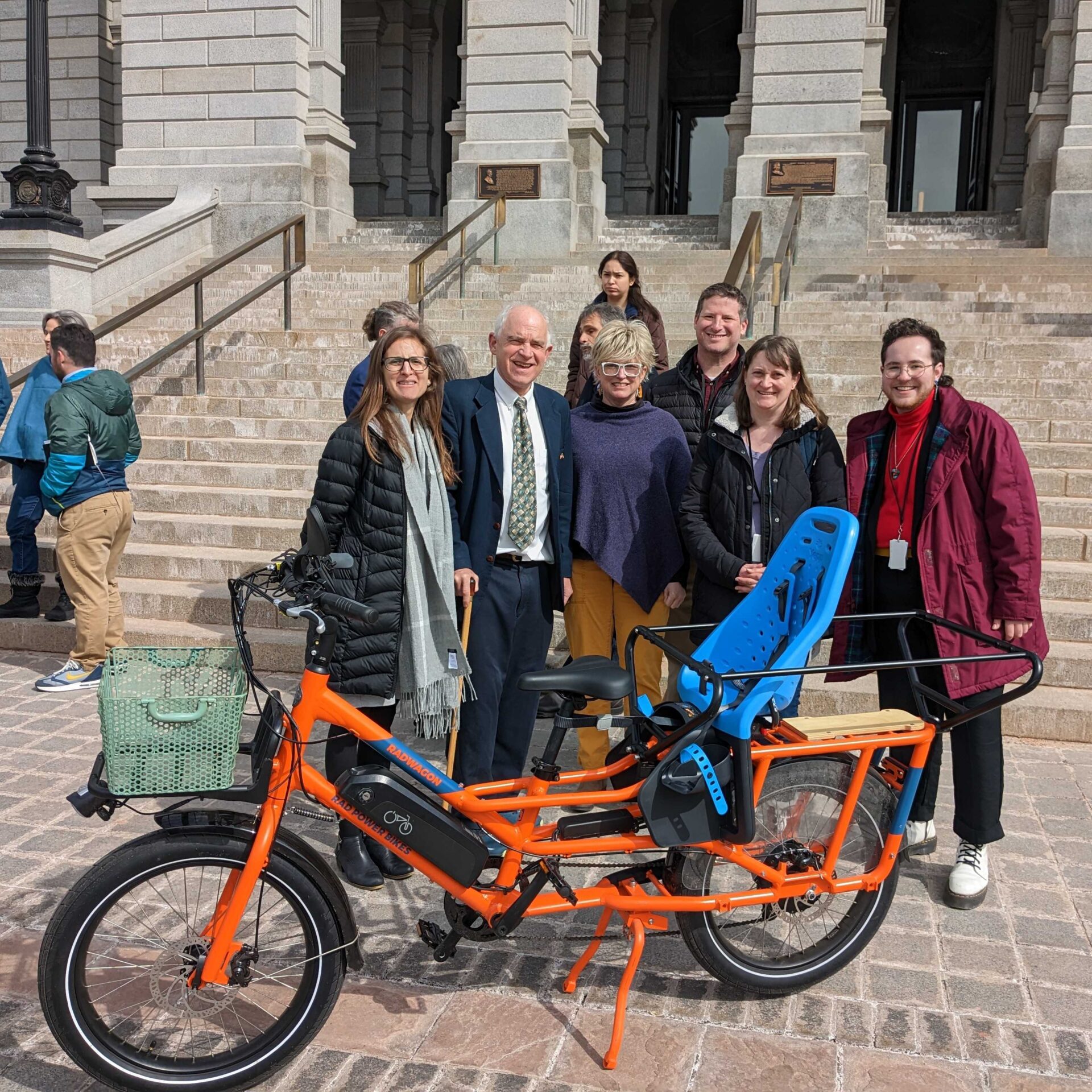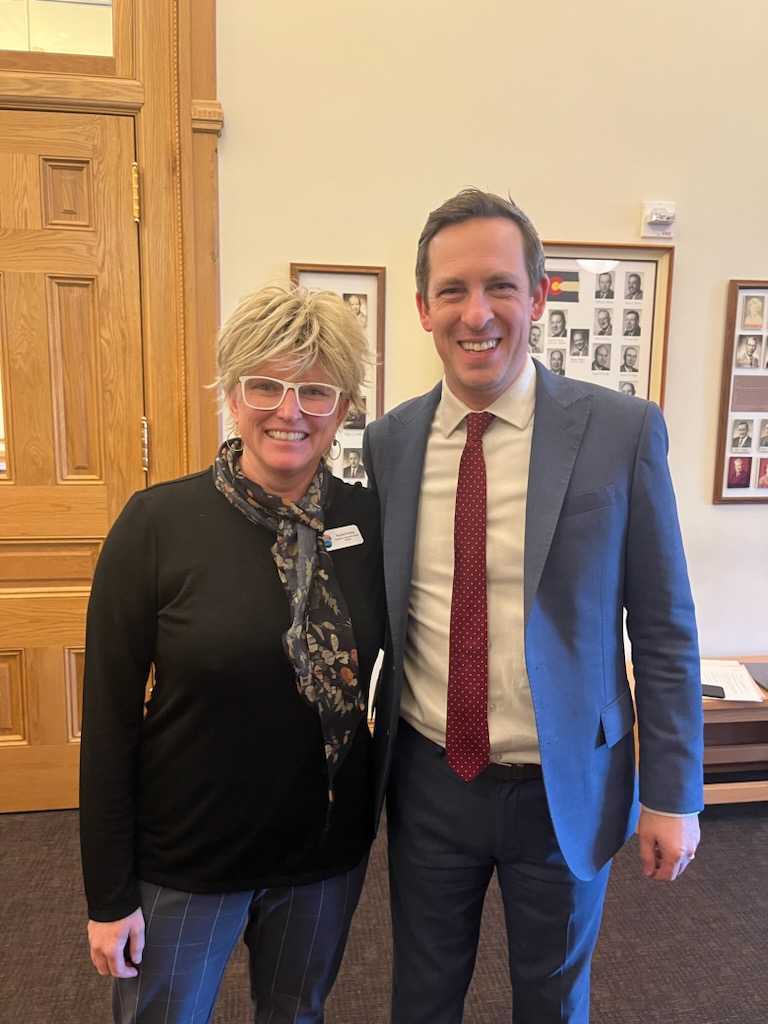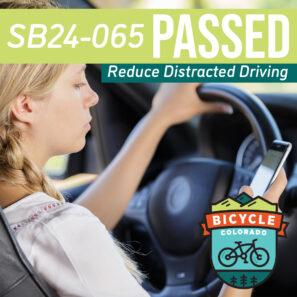Reflections on the 2023 state legislative session
Participating in the state legislative process is a high-impact aspect of our work as your state advocacy organization. When we’re successful, your lawmakers pass bills that improve safety, expand access, and elevate the experience for everyone who rides a bike. Success isn’t easy and it always looks a little different at the end than what we are seeking to accomplish at the beginning. Along the way, we work with legislators, agency leadership, partner organizations, community members, lobbyists, and most importantly, our supporters, to craft effective legislation. Legislators know and respect the strength of our organization, so when Bicycle Colorado speaks on behalf of everyone who rides or wants to ride a bike, leaders listen.

BC Policy Director Rachel posing with staff at the Colorado Energy Office in front of the Colorado State Capitol when SB23-1272 was introduced—with new tax credits for e-bikes!
Pre-season strategy
After Bicycle Colorado’s big wins in 2022 with the Colorado Safety Stop and $12 million for e-bikes incentive, we decided this year to make roadway safety our top priority with a focus on reducing deadly speeding through driver accountability and increasing driver education. We also wanted to ensure Colorado continued to lead the nation with investments expanding access to e-bikes for all Coloradans.
Legislative work begins about six months before the session kicks off in January, when we start meeting with potential legislative sponsors and lead agencies to rally enough support to introduce key bills and mitigate opposition. After several years of attempting, and failing, to expand automated enforcement, Bicycle Colorado did months of collaborative prep work to craft a bill with buy-in from key sponsors and partners. Before the session even began, we were ready with allies, strategies, a respected lobbyist, open lines of communication, and a talented staff.
Off to the races
On January 9, the legislative session officially started, launching four months of ups, downs, excitement, a bit of drama, and a focused effort to make Colorado more bike-friendly. For Bicycle Colorado, our biggest surprise was losing Piep van Heuven in February when she moved on to her next adventure. Piep was our Government Affairs Director and served as a talented legislative mastermind who curated key relationships. Our Executive Director, Pete, and our Policy Director, Rachel, stepped up to keep the momentum going on our two lead bills: SB23-200 (“Automated Enforcement”) and HB23-1272 (“E-Bike Tax Credits”).
Both of these bills required intense coordination with the legislative sponsors who introduce the bills, state agencies, municipalities, community members, retailers, and our lobbyist. Bicycle Colorado worked to get these through committees and survive floor votes. We negotiated amendments on behalf of our supporters. We sent calls to action. We often held our breath but never stopped pushing to make sure each revision improved safety or expanded access for people who ride a bike in Colorado. Bicycle Colorado also monitors other bills and occasionally takes a position. After Piep left, we mainly focused on our two bills but we were monitoring HB23-1101 (which passed and was signed by the governor) which expanded Fare Free Transit funding statewide to combat ozone season amongst others.
The Long Shot: SB23-200 aka “The Speed Camera Bill”
About the bill
This bill would allow local cities and counties (“municipalities”) to have more flexibility than before in choosing where to install speed cameras to encourage driving at safer, legal speeds. Municipalities will be able to install fully automated speed cameras in any location.
Despite a lot of prep work, this bill was looking like it wasn’t even going to be introduced for lawmakers to deliberate on! Bicycle Colorado worked to make sure this bill was introduced after all, though late in the session. And, thanks to our supporters who responded to our Action Alerts and provided personal testimony on behalf of the 745 people who died in traffic crashes last year, the bill has passed the state legislature. SB23-200 faced significant challenges including concerns from Colorado State Patrol, Colorado Department of Transportation, the Department of Revenue and Colorado Motors Carriers Association. Bicycle Colorado worked to ensure your representatives didn’t let bureaucratic technicalities supersede the need to reduce speeding on our most dangerous roads.
The bill was signed into law by the Governor on June 5 and will go into effect June 1, 2024. In the meantime, Bicycle Colorado is excited to work with local municipalities interested in effectively and equitably using speed cameras to combat speeding to learn about their new options and think strategically about how to use them.
Why it matters
Hundreds of people die in crashes in Colorado every year. That’s hundreds too many. In nearly half of crash deaths in our state, a driver is driving over the speed limit and/or too fast for road conditions. This matters because the faster a motor vehicle is moving, the higher the risk of death or severe injury in the case of a crash, especially if it involves a bicyclist, pedestrian or other vulnerable road user. We’re concerned about our neighbors biking and walking on or across high-speed roads. While the best way to decrease deaths on our roadways is to build out infrastructure and vehicle regulations that naturally slow drivers and make vehicles less dangerous for those outside the car, there are additional tools that can be used to support that goal, like speed cameras (also known as “automated enforcement”).
Right now, Colorado sets significant limits on the use of speed cameras. They can only be used in residential, school, park and construction areas, but not on high-speed roadways where most crashes occur. We don’t even mean highways—many communities have wide roads with speed limits higher than 45 miles per hour running right through residential and business communities, which is an extremely dangerous situation. Additionally, current law requires a person to be present near or with the camera during operations, which means cameras can only be used at specific times and are more expensive to operate. The bill removes location restrictions and lets speed cameras be fully automated. We hope that municipalities will be able to take advantage of the expanded use of speed cameras that this bill permits as a tool among many to create safer speeds.
What does this really mean?
The speed camera bill offers an important tool for communities to encourage safe driving behavior in a way that is consistent, hands-off and more effective than is currently allowed. This bill will allow municipalities to install fully automatic speed cameras in any location, so they can use them in the places where they will be most effective for reducing crashes. The bill also comes with some guardrails to ensure that cameras are installed equitably and that tickets and other requirements aren’t placing an unfair burden on people in lower-income communities and those that have historically experienced discrimination by police and the legal system. While we work to encourage better policies and standards for infrastructure that creates safer—and less—driving, this bill is an important stopgap.
The Biggest Impact: HB23-1272 aka “The E-Bike Tax Credit Bill”
About the bill
This exciting, nation-leading bill has been signed into law by the Governor and will go into effect in April of 2024. It is a package of different tax credits that will be in effect through June 30, 2033, to encourage people and businesses to go electric in various ways. Most excitingly for us, it includes a tax credit to encourage buying and using e-bikes to replace car use! This bill funds nearly $90,000,000 in $450 tax rebates for all Colorado residents over nine years, resulting in over 125,000 new e-bikes in Colorado by 2033, displacing 3 million car miles each week.

Rachel with Senate President Steve Fenberg, discussing HB23-1272’s e-bike tax credits.
We were beyond excited to support the e-bike tax credits built into this bill. Working on it was a reminder of the importance of coordinating different stakeholder needs and acting with grace and a spirit of cooperation to meet our objectives. This bill was originally a bit of a stressor for local Colorado bike shops, operating on thin margins, who get the tax credit but are only reimbursed quarterly. Bicycle Colorado worked closely with local bike shop owners and the Colorado Energy Office to ensure retailers could retain a fee to help cover the costs incurred by the program, while still prioritizing our main goal to get more people on bikes.
Why it matters
The state of Colorado has official goals of reducing greenhouse gas emissions to reduce climate change impacts—and transportation is where most of our emissions come from. When more people ride e-bikes instead of cars for their daily trips, we’re switching from polluting gas-powered vehicles to highly efficient, human-sized transportation. The tax credits for e-bike purchases in this bill help offset the often high upfront costs of getting an e-bike, which can be a big barrier for people. Besides reducing greenhouse gas emissions, switching to biking more generally is healthier for our bodies and our communities. We’re excited that this bill will help get more folks on e-bikes because they allow more people, like parents, older adults, people with disabilities, people with a lot of cargo, and more, to get around by bike instead of a car more easily. Bicycle Colorado is eager to make sure all these new riders have safe places to ride and are part of Colorado’s bike movement.
What does this really mean?
When the governor signed this bill on May 11, the state of Colorado definitively made it official that e-bikes are part of the transportation system and critical to combating climate change. The bill will give you a $450 discount on an e-bike, helping offset the upfront cost of these bikes. The tax credit goes to bike shops, who get the credit in exchange for discounting the bikes. That means a cheaper e-bike when you go to a Colorado bike shop.
The One That Got Away: SB23-011 aka “Minor Driver’s Education Requirements”
Sadly, this bill died early; it started going through the process of being read and voted on in different committees but got stuck between committees and didn’t make it through. The intention was to increase education requirements for all minors under 18 years of age, including behind-the-wheel instruction. Currently, drivers 16 years of age and older do not need to complete a course, they just need to pass the written and driving test. We will continue to work to make sure all drivers know the rules and best practices when they are behind the wheel to make our roads safer for vulnerable road users.
If you want to learn more about the specific bills we lead on, supported, or opposed, please visit our Current Issues page.
If you’d like to support our work to ensure that Colorado laws prioritize safety and access for people riding bikes and other vulnerable road users, please join us as a sustaining member or donate. We are grateful to our supporters for making our work possible.
Leave A COMMENT
Our twitter feed is unavailable right now.
The Latest News
view all- Jun 13, 2024
- by Bicycle Colorado
Discover Denver With Denver Century Ride
- Bicycling in Colorado,
- Denver,
- Event Member Spotlight,
- Events
- No Comments








